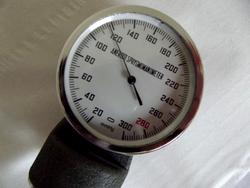Acupressure at the point sanyinjiao or SP-6, just above the ankle, decreases maternal anxiety and analgesic consumption during labour, Iranian researchers have found. A total of 131 women in labour at Maryam Hospital, Tehran were randomly allocated to receive acupressure, touch applied as a control, or routine care. Within 30 minutes of starting the intervention, mean anxiety in the acupressure group was significantly less than both control groups, and it remained so 30 minutes after finishing the intervention. Sedative and analgesic consumption was also significantly lower in the acupressure group compared with the control groups.
The researchers conclude that acupressure at SP-6 could be considered an alternative method to decrease maternal anxiety and use of sedative and analgesics, especially pethidine.
(The Effect of Acupressure at Spleen 6 Acupuncture Point on the Anxiety Level and Sedative and Analgesics Consumption of Women during Labor: A Randomized Single-blind Clinical Trial. Iranian Journal of Nursing & Midwifery Research, March – April 2018.)

 Researchers in Australia studying acupuncture for depression in pregnancy, report that it could be a valuable and supportive intervention. In a small study, eight women took part in a pragmatic, randomised, controlled trial and were subsequently interviewed about their experiences. They reported that conventional treatments had been inadequate or unsatisfactory, or were now unacceptable in pregnancy. They experienced not only symptom relief, but also described benefits from acupuncture which enabled them to better manage their lives and the changes brought about by pregnancy.
Researchers in Australia studying acupuncture for depression in pregnancy, report that it could be a valuable and supportive intervention. In a small study, eight women took part in a pragmatic, randomised, controlled trial and were subsequently interviewed about their experiences. They reported that conventional treatments had been inadequate or unsatisfactory, or were now unacceptable in pregnancy. They experienced not only symptom relief, but also described benefits from acupuncture which enabled them to better manage their lives and the changes brought about by pregnancy.
